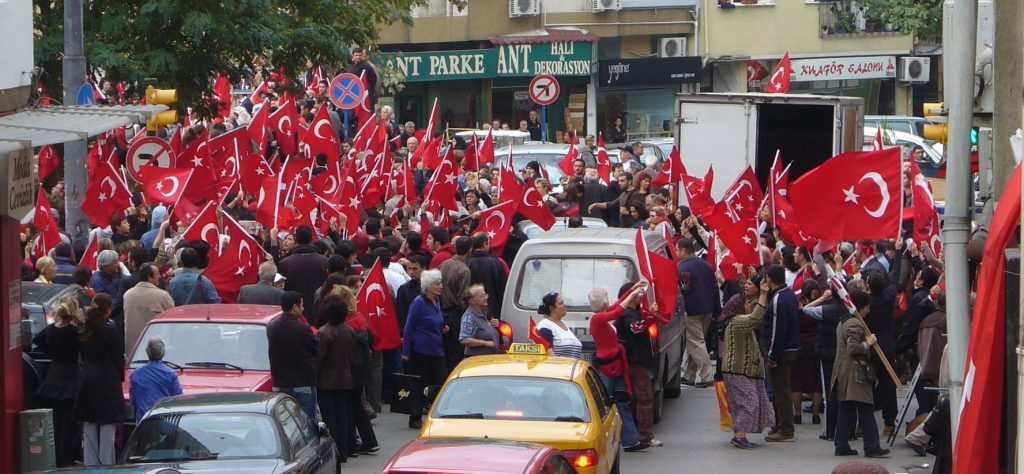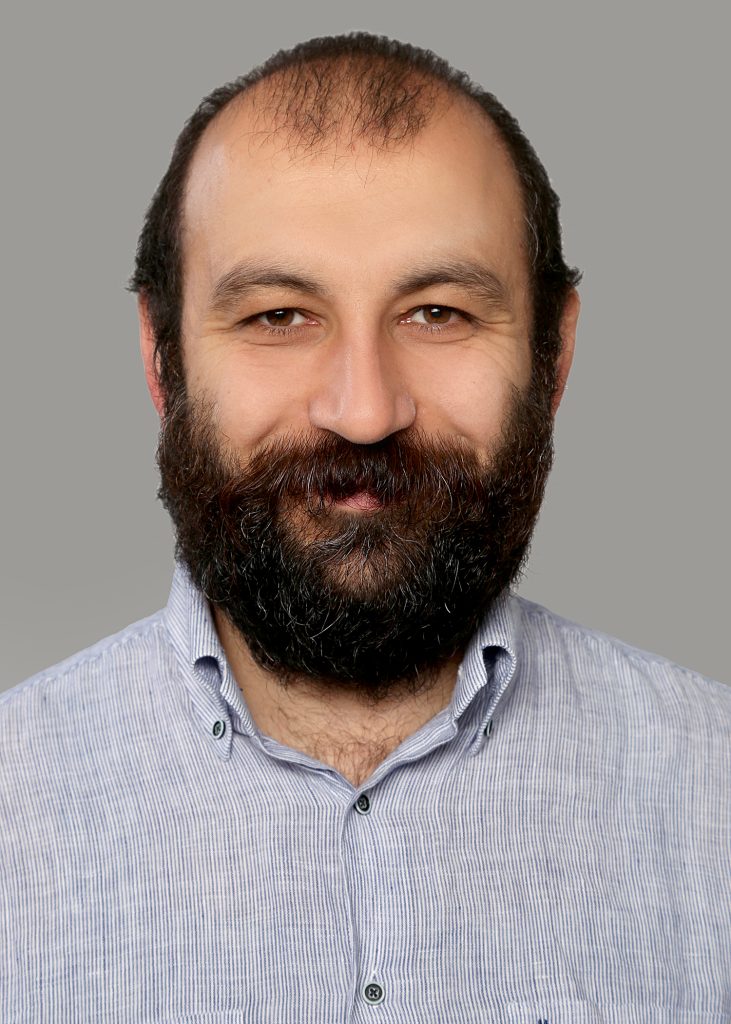As the PKK Disbands, Erdoğan Tightens His Grip on Türkiye
More than forty years after its creation, the PKK is fading from view – along with the long-held goal of an independent Kurdish state. For Türkiye, this could mark the beginning of peace and reconciliation. But the Erdoğan administration has other plans. Rather than uniting the country, it is pressing ahead with consolidating its power, undeterred by recent protests. What looked like the end of a decades-long conflict may in fact mark the entrenchment of authoritarian rule.
On 12 May 2025, the Kurdistan Workers’ Party (PKK) announced plans to dissolve. Three weeks later, Turkish social media lit up with images of opposition party members lined up before police officers—an echo, for many, of 2009, when Kurdish politicians were similarly paraded following mass arrests. The parallel was both deliberate and unsettling. While the government has floated the possibility of renewed peace talks with Kurdish groups, it has at the same time escalated its crackdown on both the Kurdish and non-Kurdish opposition. Against this background, the rhetoric of peace appears less like a step toward democratisation than a calculated effort to consolidate authoritarian control while neutralising potential challengers.
For over four decades, the PKK has been engaged in an armed struggle against the Turkish government. Founded in 1978 with the initial aim of establishing an independent Kurdish state, the organisation evolved over time to demand greater political and cultural rights for Kurds within Türkiye. The conflict, which began in earnest in 1984, has claimed tens of thousands of lives and deeply shaped both the Kurdish movement and Turkish domestic politics. Multiple attempts at peace negotiations, including a high-profile process between 2013 and 2015, ultimately failed, leaving a legacy of mistrust and cyclical violence.
What Drives the Emerging Bargain?
Today, the rationale for the Kurdish movement to enter negotiations is increasingly shaped by structural constraints and diminishing returns on confrontation. In recent years, Türkiye has successfully pushed armed conflict beyond its borders. Military confrontations involving the PKK now occur almost exclusively in northern Iraq and northern Syria. While the PKK has occasionally demonstrated its continued capacity for attacks inside Türkiye, its armed campaign has lost much of its domestic relevance. The organisation’s armed struggle, once seen by some as a form of leverage in the broader Kurdish political movement, has increasingly become a liability. As evidenced by the 2024 country report of the Bertelsmann Transformation Index (BTI), the Turkish state has largely reasserted its monopoly on the use of force within its borders, reflected in an improved score of 8 on a 10 point scale up from 6 in previous years.
Meanwhile, the pro-Kurdish Peoples’ Equality and Democracy Party (DEM) continues to face intense political pressure, including the ongoing threat of trustee appointments to its municipalities and legal repression. Coupled with the broader criminalisation of civil society and opposition actors, this environment has created strong incentives for Kurdish elites to engage in negotiations. In such a climate, even limited concessions—such as a suspension of the trustee policy or an easing of judicial pressure—can register as meaningful political gains. More ambitiously, discussions around constitutional guarantees for Kurdish rights have resurfaced, offering the possibility of long-term recognition within the framework of state identity.
From the government’s perspective, the current peace overtures are closely aligned with President Erdoğan’s personal political need to remove the constitutional term limit that bars him from running again unless early elections are called. A constitutional amendment could resolve this, but doing so would require more than just parliamentary numbers—it would also demand a broader sense of legitimacy. Reviving peace talks with Kurdish actors may offer symbolic cover for such a change. Yet this is only the tactical layer. The deeper, more strategic objective lies elsewhere: Erdoğan wants to restructure Türkiye’s political opposition and consolidate a more stable form of authoritarian rule.
The main opposition, the Republican People’s Party (CHP), is increasingly subjected to the same tactics once reserved for the pro-Kurdish DEM: judicial harassment, criminalisation, and the looming threat of state intervention. In several municipalities, legal processes are already underway to justify the replacement of elected CHP mayors with court-appointed trustees—a strategy first used against DEM. This wave has already reached one of the party’s most prominent figures: Ekrem İmamoğlu. The mayor of Istanbul and CHP’s officially declared candidate for the next presidential election, is currently in custody following a controversial court decision. As the scope of repression appears to be expanding beyond local governance, the next steps may involve bringing the party’s national leadership under control—potentially sidelining or replacing it with a more compliant figures at the helm. Meanwhile, DEM is expected to remain politically passive in exchange for reduced pressure. This dual strategy of repression and co-optation is already reshaping the party system, not through electoral competition but through managed exclusion and selective tolerance.
The regime’s broader aim is to fragment and control the opposition space, transitioning Türkiye from a competitive authoritarian regime to a hegemonic authoritarian one, where elections still take place but no longer offer meaningful path to power alternation. In this emerging political order, the opposition is not simply suppressed but reshaped: roles are reassigned, loyalties tested, and silence rewarded. The management of political cleavages, once a potential site for democratic reconciliation, now serves to stabilise authoritarian rule through fragmentation and selective incorporation.
The Syria Angle
While the primary motivations behind the current peace overtures lie in domestic power consolidation, developments in Syria play an important role, too. Rather than being a mere external variable, the Syrian context and Türkiye’s internal political strategy are increasingly interdependent, each shaping and amplifying the other.
A key development occurred on March 10, when the Syrian Democratic Forces (SDF) and the Damascus regime reached an agreement outlining steps to integrate SDF-affiliated structures into formal Syrian state institutions. The Turkish government, which has long insisted on the dissolution of the SDF, responded with uncharacteristic restraint. This shift coincided with ongoing negotiations between Türkiye and the PKK regarding the group’s dissolution. Taken together, these developments suggest that the dismantling of the PKK may undermine Ankara’s core justification for its longstanding objections to the SDF. As a result, Türkiye may adopt a more permissive stance toward Kurdish self-governance in Syria, provided it remains under Damascus’s sovereignty.
However, the relationship cuts both ways. If the domestic process in Türkiye collapses, the government may once again adopt a hostile posture toward Kurdish self-governance in Syria, as it did following the breakdown of the 2015 peace talks. Such a turn could further destabilise an already fragile regional environment. At present, the first scenario appears more likely.
A Peace that Consolidates Authoritarian Rule?
The current political opening in Türkiye does not reflect a return to democratic normalcy but rather a recalibration of authoritarian rule. While the dismantling of the PKK may mark the end of an era in Türkiye’s internal conflict, it is unlikely to produce meaningful reconciliation unless accompanied by broader structural reforms. Instead, the process appears intended to eliminate armed resistance, fragment the opposition, and legitimise future constitutional change. If this strategy holds, it will not only reshape domestic power dynamics but also alter Türkiye’s regional posture, particularly in Syria. The resulting order may be more stable, but it will also be more tightly controlled, a peace that reinforces authoritarian consolidation rather than challenging it.
First published on Voxeurop

